Centres of Excellence
The Paget’s Association introduced an award to recognise hospital (NHS) and university departments which demonstrate excellence in both the treatment of Paget’s disease and research into the condition. The UK centres which have been recognised as Paget's Association Centres of Excellence are listed below.
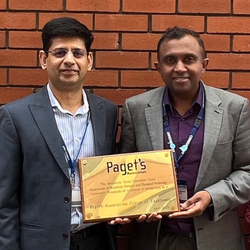
Leicester
WebsiteThe Centre of Excellence in Leicester is based at the Metabolic bone clinic, that runs under the department of Chemical Pathology and caters to all types of Metabolic bone disorders including Paget's disease.
Dr Faiz Rahman, Dr Prashanth Patel
- Clinics at Leicester Royal Infirmary and Leicester General Hospital
- Day case investigation unit at Leicester General Hospital
- Access to bone turnover markers
- Other services such as MSK radiology, Orthopaedics, ENT and Nuclear medicine are also available at UHL Trust
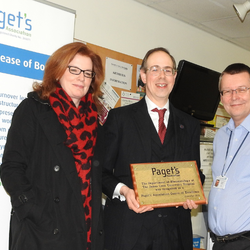
Middlesbrough
WebsiteThe Bone Clinic is based at James Cook University Hospital, within the Department of Rheumatology. Clinics take place for those with Paget's disease as well as other bone disorders. Dr Tuck and the team in Middlesbrough are also involved in research into Paget’s disease. The team consists of Dr Stephen Tuck (clinical lead and director), and two consultant biochemists (Dr Harish Datta, Dr Isaac Oluwatowoju and a registrar). The wider team includes physiotherapists, and occupational therapists, specialist radiologists and pathologist (Dr Julie Walker). They work closely with orthopaedics and provide a full range of treatments.
Dr Stephen Tuck
- Dedicated day case unit
- Tertiary referral centre for complex cases
- Imaging including x-ray, CT, MRI and isotope bone scans
Email: angela.coverdale1@nhs.net
Telephone number: 01642854759
Department of Rheumatology
James Cook University Hospital, Marton Road
Middlesbrough
TS4 3BW
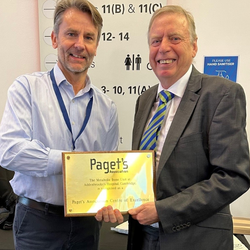
Cambridge
WebsiteConsultant rheumatologist and metabolic bone physician Dr Gavin Clunie heads the team at the Metabolic Bone Unit at Addenbrookes Hospital, Cambridge. They also participate in multicentre research studies and audits of clinical care across the region.
Dr Gavin Clunie
- Day case facilities for treatment
- Diagnostic investigations on site
- Supported by a multidisciplinary team
Metabolic Bone Unit, Cambridge University NHS Hospitals NHS Foundation Trust
Addenbrookes Hospital, Hills Rd
Cambridge
CB2 0QQ
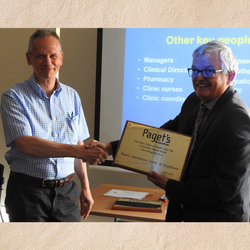
Llandough and Cardiff
WebsiteEstablished in 1992, the Metabolic Bone Disease service has a long and proud tradition of assessing and treating patients with Paget's disease. Consultant physician Dr Mike Stone is the Director of Bone Research Unit and close ties with other research and clinical departments have enabled the service to flourish. Outpatient clinics are at the University Hospital Llandough and Cardiff Royal Infirmary.
Dr Mike Stone
- Specialist nurses run a dedicated Infusion Clinic
- Clinical bone research unit at Llandough Hospital
- Supported by a multidisciplinary team
Contact: Prof. Michael Stone, Bone Research Unit, University Hospital Llandough, Penlan Road, Penarth CF64 1XX
Telephone: Secretary - Janine 029 20716957
Metabolic Bone Disease service, Cardiff and Vale University Health Board
University Hospital Llandough, Penlan Road
Penarth
CF64 1XX
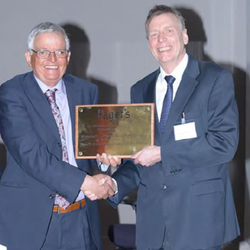
Edinburgh
WebsiteThe Edinburgh Centre of Excellence has all the services necessary for the evaluation, diagnosis and treatment of Paget’s disease. Director Prof Stuart Ralston sees patients in clinic and conducts world-leading research into the prevention, causes and treatment of Paget’s diseases. Researchers here have led the way in evaluating treatment strategies for Paget’s disease and have played a leading role in identifying genes that predispose to the condition.
Professor Stuart H Ralston
- Full services for evaluation, diagnosis and management of Paget’s
- Fully equipped research laboratories
Contact: Rosa-Lee Schafer, Administrative Support Officer
Room N3.29, Institute of Genetics and Cancer, University of Edinburgh, Western General Hospital, Edinburgh, EH4 2XU
Telephone: 0131 651 8741
Email: rosa-lee.schafer@ed.ac.uk
Patient referrals (for GP’s and other specialists):
If you have a patient with Paget’s that you wish to be seen, please refer to rheumatology via NHS Sci Gateway for the attention of Prof Stuart Ralston.
Centre for Genetics and Experimental Medicine University of Edinburgh and Rheumatic Diseases Unit
Western General Hospital
Edinburgh
EH4 2XU
